#serpentine soil
Note
I have been wondering, since I plan to one day grow a sustainable food forest with lots of native plants, the thought of soil came up. Is there an important role to nutritionally poor soil? I ask because to my knowledge, some plants prefer certain soils and nutritionally light soils can be found in nature. I know this won't apply everywhere, but I do know there are plants adapted to at least tolerate deficient soil. When I tried looking this up I mostly got resources about crops in relation to nutritionally deficient soil.
@localcustard - Good question! So it's not so much that the poor soil plays a particular role, as the other way around--certain plants have adapted to growing in poor soil or other harsh conditions.
One example would be pioneer species, like certain mosses, ferns, grasses, various annuals, etc. that are able to colonize recently disturbed areas that may not have very good soil. Even later arrivals like early succession shrubs and trees may be able to handle poor soil. Generally these plants are able to subsist with fewer nutrients than other species. Many of them are nitrogen fixers, meaning they cooperate with soil bacteria that draw nitrogen from the air and turn it into a form that is more accessible to plants. Often the plants will have nodules in their roots or other tissues where these bacteria live; the bacteria get a safe place to live and access to sugars the plant makes through photosynthesis, and the plants get crucial access to nitrogen.
As these plants die, the nitrogen still stored in their tissues disseminates into the soil, making it accessible to later-succession plants that cannot fix nitrogen themselves. A good example is the red alder tree (Alnus rubra), a common first-succession tree here in the Pacific Northwest. It is a nitrogen fixer, and paves the way for later-succession conifers in many forests here. Historically timber companies have sprayed alders with herbicides when they pop up a few years after a clearcut because they didn't want the alders competing with the young Douglas fir (Pseudotsuga menziesii) (or whatever trees the timber people replanted with) for resources. However, more recent research shows that the conifers grow better when the alders are allowed to grow, in part due to the nitrogen, as well as connections through the soil microbiome (more about that in a minute.)
Another example of plants living in poor soil is plant communities that are adapted to harsh environmental conditions. One of my favorite examples is the plant community that lives on serpentine soil in the Klamath Mountains in southwest Oregon and northern California. Soil is made partly of organic material from various decaying life forms, but it is also composed of minerals from eroded rock. This means that the qualities of the bedrock below the soil has a big influence on soil composition.
Serpentine soils (which may also include other ultramafic rocks) generally are low in nitrogen, calcium, phosphorus, and other essential nutrients plants need. On the other hand, they frequently have high levels of iron, and often have a lot of magnesium, and heavy metals like nickel and chromium. Plants adapted to serpentine soils have had to evolve ways to deal with these additional toxins as well as a deficit of nutrients. Add in that serpentine soils are commonly found in places with harsh weather conditions and erosion, such as the Klamaths, and there's not much opportunity for the organic portion of the soils to build up. All of which means the plants native to the Klamath region are able to handle those poor soil conditions that would kill other plants.
So what does this mean for habitat restoration? Native plants are already adapted to the soils they evolved on for thousands or even millions of years. Some restorers actually discourage amending the soil where you're planting because aggressive invasive and other non-native plants will take advantage of the additional nutrients and out-compete the native species. Many native plants will grow just fine in amended soil; you just need to make sure to prepare to do some weeding as well. But it does mean that if your natural soil type has low in certain nutrients, you don't need to necessarily amend with those nutrients in order to make your native plants happy.
For myself, if I am starting native plants in pots I will give them a good 50-50 soil-aged manure mix to give them a good head start, and add a little into whatever hole I plant them in in the ground later on to give them a chance to adapt to the new soil. I still have to do a lot of weeding, but that's because I've chosen not to just totally annihilate all the non-natives with herbicides before planting. I also live in a fairly rural area with young, sand-based soil that is pretty close to its original form, so planting native species found in my area already goes pretty well as long as I'm also respecting each plant's need for sun, water, wind exposure, etc.
What you might consider is getting your soil tested to see what's in there. Often in places that have been changed over to agriculture, housing, and other development for many years, the soil has been significantly changed from its original form. It doesn't mean that you can't plant in soil that is heavily altered, but it's at least good to know, if you're going to amend the soil at all, what's already abundant and what's scarce.
Finally, I want to add in a quick note about the soil microbiome. Well-established soil has multiple layers of microorganisms, fungi, and other living beings in it, with different communities at different depths. Many of these will be species that native plants have interrelationships with (for example, mycorrhizal fungi that share nutrients with plants through the mycelium-root matrix.) When I am planting I try to disturb the soil as little as possible; rather than turning over an entire area of soil, I only dig where I'm going to be planting starts and other established plants so that the soil microbiome surrounding that hole can recolonize where I've disturbed it through planting. That soil microbiome is crucial to a plant's ability to handle poor soil, because it helps the plant to access what nutrients are available.
If you want to dive in deeper, a couple books relevant to the topic at Geology and Plant Life: The Effects of Landforms and Rock Types on Plants by Arthur R. Kruckeberg, and Savannas, Barrens, and Rock Outcrop Plant Communities of North America by Anderson, Fralish, and Baskin. Both are academic-level texts so they aren't casual reading, but they have a lot of good information relevant to how geology affects soil, to include nutrient-poor soils.
#localcustard#plants#botany#soil#ecology#gardening#habitat restoration#geology#permaculture#nature#naturecore#rocks#stones#serpentine#minerals#PNW#pacific Northwest
142 notes
·
View notes
Text

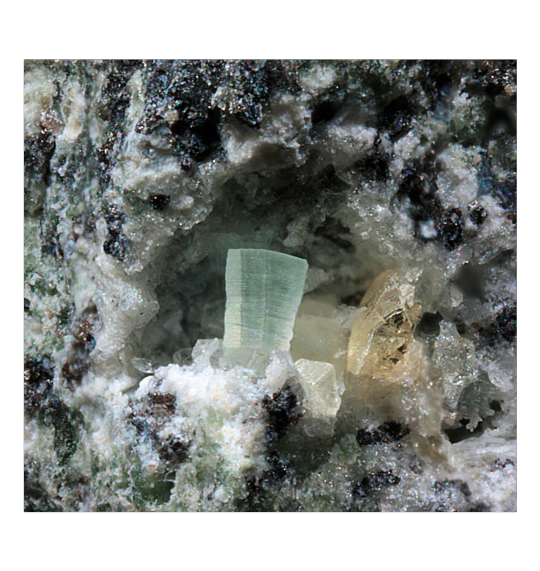

Some examples of lizardite (a common form of serpentine and component of serpentine mineral soil) from mindat.org
#a little obsessed with this rn#about me#31#dirt#soil#rocks#geology#serpentine#beautiful#green#olivine
10 notes
·
View notes
Text
all my coworkers make a big deal about how I like spiders. wait until they hear about how i want to go to the asbestos creek
#listen. it's a risk of being a serpentine soil fan.#it's in whatcom county and there's a virtual geology field trip. alas the access is via private property
2 notes
·
View notes
Text
Serpentine soils are characterized by low moisture, low concentrations of macronutrients, and elevated levels of heavy metals.
"Plant Physiology and Development" int'l 6e - Taiz, L., Zeiger, E., Møller, I.M., Murphy, A.
#book quote#plant physiology and development#nonfiction#textbook#serpentine#soil#soil nutrients#soil moisture#macronutrients#heavy metal
0 notes
Text
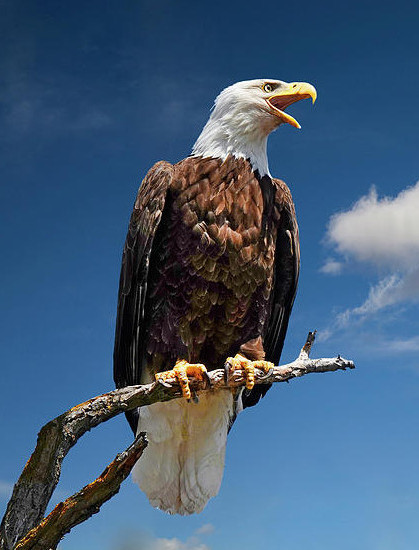
Legends and myths about trees
World tree - the source of wisdom of the ages
The world tree is a motif present in several religions and myths around the world. It is represented as a colossal tree which supports the heavens, thereby connecting the heavens, the terrestrial world, and, through its roots, the underworld.
Many Eurasian mythologies share the motif of the "world tree", "cosmic tree", or "Eagle and Serpent Tree". More specifically, it shows up in "Haitian, Finnish, Lithuanian, Hungarian, Indian, Chinese, Japanese, Norse, Siberian and northern Asian Shamanic folklore".
The World Tree is often identified with the Tree of Life, and also fulfills the role of an axis mundi, that is, a centre or axis of the world. It is also located at the center of the world and represents order and harmony of the cosmos. Each part of the tree corresponds to one of the three spheres of the world (treetops - heavens; trunk - middle world or earth; roots - underworld) and is also associated with a classical element (top part - fire; middle part - earth, soil, ground; bottom part - water).
Its branches are said to reach the skies and its roots to connect the human or earthly world with an underworld or subterranean realm. Because of this, the tree was worshipped as a mediator between Heavens and Earth. On the treetops are located the luminaries (stars) and heavenly bodies, along with an eagle's nest; several species of birds perch among its branches; humans and animals of every kind live under its branches, and near the root is the dwelling place of snakes and every sort of reptiles.
A bird perches atop its foliage, "often .... a winged mythical creature" that represents a heavenly realm. The eagle seems to be the most frequent bird, fulfilling the role of a creator or weather deity. Its antipode is a snake or serpentine creature that crawls between the tree roots, being a "symbol of the underworld".
The imagery of the World Tree is sometimes associated with conferring immortality, either by a fruit that grows on it or by a springsource located nearby. In some descriptions this "water of life" may also flow from the roots of the tree.
The world tree was an important element in shamanistic worldview as well, and it is said that the giant bird ... hatches shamans in the branches of the World Tree.
Some species of birds (eagle, raven, crane, loon, and lark) are revered as mediators between worlds and also connected to the imagery of the world tree. Another line of scholarship points to a "recurring theme" of the owl as the mediator to the upper realm, and its counterpart, the snake, as the mediator to the lower regions of the cosmos.
Northern Eurasian and Central Asian traditions wherein the World Tree is also associated with the horse and with deer antlers which might resemble tree branches.
Some scholars have pointed out that, from the perspective of evolutionary biology, the concept of a world tree may have originated in human thought. This is because our ancestors lived in trees for about 60 million years, and for them the trees were everything in the world. This is why the collective unconscious that the world is made of giant trees has remained with us to the present day.

木にまつわる伝説・神話
世界樹 〜 時代の叡智の源
世界樹は、世界中の宗教や神話に見られる概念、モチーフである。天を支える巨大な木として表現され、それによって天と地上世界、そしてその根を通して冥界をつないでいる。
多くのユーラシア神話が「世界樹」「宇宙樹」「鷲と蛇の樹」というモチーフを共有しているとされている。具体的には、「ハイチ、フィンランド、リトアニア、ハンガリー、インド、中国、日本、北欧、シベリア、北アジアのシャーマン伝承」に見られる。
世界樹はしばしば生命の樹と同一視され、また、世界軸、つまり世界の中心や軸の役割を果たす。また、世界の中心に位置し、宇宙の秩序と調和を表している。樹木の各部分は世界の3つの圏(梢-天、幹-中世界または地、根-地下世界)のいずれかに対応し、古典的な元素(上部-火、中部-地、土、地面、下部-水)にも関連している。
その枝は天空に届き、根は人間界や地上界と地下世界や地底界をつなぐと言われている。そのため、この木は天と地を結ぶ媒介として崇拝された。梢には星や天体があり、鷲の巣がある。枝には数種類の鳥がとまり、枝の下には人間やあらゆる動物が住み、根の近くには蛇やあらゆる爬虫類が住んでいる。
その葉の上にとまる鳥は、「しばしば......翼を持つ神話上の生き物」であり、天界を表す。鷲は最も頻繁に見られる鳥で、創造主や天候の神の役割を果たしているようだ。その対極にあるのは、木の根の間を這う蛇や蛇のような生き物で、「冥界の象徴」である。
世界樹のイメージは、そこに生る果実や近くにある泉によって不老不死をもたらすことと関連付けられることもある。この「生命の水」は木の根からも湧き出るという記述もある。
世界樹はシャーマニズムの世界観においても重要な要素であり、「巨大な鳥は......世界樹の枝でシャーマンを孵化させる」ともいわれている。
いくつかの種の鳥(ワシ、ワタリガラス、ツル、ハシビロコウ、ヒバリ)は、世界をつなぐ媒介者として崇められ、世界樹のイメージとも結びついている。また、別の研究では、フクロウは天上界への媒介者であり、それと対をなすヘビは宇宙の下界への媒介者であるという「繰り返されるテーマ」が指摘されている。北ユーラシアや中央アジアの伝統では、世界樹は馬や、木の枝に似た鹿の角とも関連づけられている。
一部の学者は、進化生物学の観点から、世界樹という概念が人類の思考の中に元から備わっている可能性を指摘している。というのも、人類の祖先は約6000万年にわたり樹上で生活しており、その時代の彼らにとっては木々こそが世界のすべてであったと考えられるからである。そのため、この世界は巨大な木で出来ているのだという集合的無意識が、現在の我々に至るまで残っているのだというものである。
#trees#tree legend#tree myths#legend#mythology#folklore#world tree#bird#tree of life#water of life#sharamanism#nature#art#source of wisdom
143 notes
·
View notes
Text

Part Nine: Drownings
Chapter Directory: Here
Current Installment: You are here!
Author's note: Inspired by the 1950s short story "The Man Who Came Early" by Poul Anderson. I rewrote this seven times and had an unrelated mental breakdown. I'm still not happy with it but at least everything that was in the outline is in this version. No major trigger warnings for this chapter. Also on ao3 here.
Burial Mound, Cumbria
Matthew slid beneath the water, practically consumed by the dark concentric circles flowing out and lapping gently at the stone. They had built the spring like an inverted broch, no mortar, all perfectly fitted stone.
“No!” Arthur was whipping off his coat. The wool would only become waterlogged and drown him. His body was a spring, energy coiling from shin to shoulder, arms thrown up over his head to break the surface tension, anything to give him an extra boost to get and clasp his son to him. Toes off the ground, arms snatched him back.
“No!” Rhys was slamming him to the ground like he was a boy, and Mother was a corpse upon a driftwood throne. There’s scuffling. He flipped himself over, white-hot rage replacing whatever desperation was before.
“Let me go!” It was always English when they argued, a force of speech as effective as a spear point since the Angles.
Rhys drove down, rolled him over, face in the moss and clover of the Cumbrian soil beneath his face, the heart of him a thousand years ago and forbid him in a dead language. More loss. He wouldn’t take more loss. But his arm would snap if he struggled anymore.
“Rhys.” Brighid was pulling him off. “Rhys, let him go.”
“No!” He shot back at her. “Absolutely not—”
“You have too.” She looked gentle now, not fearsome. Herself, St. Brighid, not the warrior goddess mother left her to inherit. Soft clover, her prized cattle roamed rather than the wine-dark seas that thrashed her shores. Her hand released him.
Rhys was protesting, but he wasn’t fighting or wrestling. Arthur couldn’t hear him or Brighid now. Their voices were silent; Alasdair was on the ground, shed of his clothes, bleeding from a cut on his hairline. He almost snorted. Brighid would have had to strike him as hard as she could to stop him. Alasdair was saying something, mouth open to the French that was so familiar, calling after his favourite nephew. But his attention was gone now. The water spoke to him with Alfred’s laugh.
He dove.
—
Sometimes, when Matthew hasn’t slept, the ice starts whispering at home. Singing or whispering, luring him with cracks in the seracs as serpentine as a woman’s hips. It whispers about how much of him is already frozen. He can rest as much as he wants if he lays down and slips into blue-black waters. It sighs and tells him he can close his eyes, and everything will be all right. Tempts him. He’ll be so numb, but for a good reason. Everything would slide away, and he would be as empty as he felt. Sometimes, the ice sings.
And sometimes, he answers. He’s laid himself down into a gap in the pack ice for a nap so casually that the frigid water rushing over him feels gentle, not cold and cutting. Matthew has closed his eyes and let himself float away. He could emerge in a few months with the spring melt, float up, and return refreshed and rebuilt. Any absence unconsidered, and anyone who might have eventually noticed usually yet unbothered.
The spring sings like that, in a gentle burble instead of staccato groans but promising nonetheless. His brother’s laugh has gone quieter, disappearing under the water. The dry stone edge of the spring is cold under his hands, but the lure is louder, and the water is not so cold. Words his aunt sang drop from sounds flesh might make to the deep metallic of something like bronze clacking on stone. Like wind forced through chimes or a horn. The water sings like that, a hymn for the missing or maybe the mad, urging him on as he let himself sink and then swam down, searching for a bottom as he kept one hand on the round stone wall.
Then, the world was rotating. The light had gone so bright. Turning, he slammed against the stone, what air he had left bubbling out of his mouth and gurgling away. Fuck. He tried to twist and paddle up; he could swim like a fish, but something had snagged—no! Something had grabbed and hauled him up from behind. He must have been running out of air. His vision flashed red, even against his shut eyelids, and he broke the surface. Heaving, he groped for stone but found green and freshly cut wood boards. A woman looked down at him, a bucket fitted together of wood in her hand. Her hair was pulled out of her face in a crown of braids. The linen shift she wore draped off her shoulders and dipped below the neckline of her bodice, a style that had been popular when he was a child, but it was her eyes he’d locked on.
“Katya?” She looked a bit healthier than he’d ever known her to be, but her eyes were the same sky blue. Hope and harvest blue. He would have recognized her if he didn’t have eyes, though, because that part of him that was hers sang louder than the water or the shout coming from behind him. Something was pulling at his shoulder. He didn’t care. Matt pulled himself closer. He could smell summer wafting off her.
Her surprise turned to something tender, and her hand lifted to his face and beckoned behind him. Someone else was saying his name from his shoulder. He didn’t care.
“I’m not what you’re looking for yet.”
“Yes, you are.” He said. “I’ll always look for you.”
“But not yet.” She insisted. Pushing his soaking wet hair off his face. “Return to my dreams, wraith.”
“Katy—” He was being dragged away then. She didn’t look sad but hopeful.
“Swim.”
“What the fuck— DAD?”
“My sons and their cocks, I swear to God.” Arthur was griping, and Matt was spinning, looking for a handhold to climb the wall of the… was it a well he was inside of? It was not a spring; the water was too cold and too dark. He was shivering. Katya was there, happier than he’d ever seen her, and he was stuck here, pushed away, banished.
“Matthew!” Two hands on his face, making him look. His father was soaked but deathly serious. “Focus.”
“What?”
“Focus on your brother and swim.”
His father’s voice cut the panicked babble of thoughts, and he heard the laugh again. He sucked in the air and dove. If it was one thing he was, it was a good swimmer, reaching out and down, striving forward. He has never seen such darkness. Only the odd, purposeful tap on his calf keeps him in contact with his father. They don’t have much time before Arthur begins to freeze, or they burst for air. His lungs are straining, individual bronchioles tracing branches of pain through his chest when light shines. Harvest gathering greens, mostly, then woad blues and sparks of red like fruit. If only stained glass could flow and distort light like tide pools, it would look like this. He can’t tell which way is up then. He can’t breathe. He’s blacking out, hand reaching for his father’s tumbling form next to him as they fell rather than swam. The colours drained from the world, and rushing water froze, black and fractal.
Then he’s on his back, and his father is slapping him across the face. He jackknifes into consciousness. Dad’s there, dripping like a drowned rat. But his body is normal. No blood showed, no bones were broken, and strength flooded back into his extremities as his body staved off hypothermia in the much warmer air.
“What the fuck was that?” He gasped.
“Breathe.” Arthur is a bit frantic. They’re both shivering. “Focus.”
“Where are we?” Matt was so confused. He recognized stones, the well. But there were so many trees. The trunks were as tall as any he had at home, taller than anything that had been replanted after they’d been hacked from him to build the empire. The rainbow of smeared colour still danced in his eyes and his vision smeared.
“Not where.” Arthur was pale. “When. I haven’t had this many oak trees since before your brother was born.”
“When?” Matt practically gagged on a shiver and laid back down. “Was that—Was that the rainbow bridge? Like the sagas?”
“The— Rainbow bridge? Really, lad? You gawking at Kateryna was the single most heterosexual thing I’ve ever seen you do.”
The less relevant his sense of humour, the more fucked they were. But the blood rushing back into his fingers and toes hurt ungodly amounts. He lost focus again, the trees blurring into the low clouds like brushes into well-used rinse water, only revealing the buttresses of his grandmother’s pre-Christian cathedral in the foliage. Better than stained glass.
He’s lying there, aware of Arthur having gotten to his feet, but not other people, until there are voices. He sits again. A small caravan of wagons heaped with goods stands at the edge of the clearing, and his father is speaking with them. He can only make out so many words. He almost thinks they’re speaking Dutch for a moment, those fluid, almost gurgly sounds Jan makes when he’s happy and well fucked. His body feels so normal now, warm and boneless, like he’s eaten and slept so much he needs to sleep more. He’s supposed to be alert but can’t understand what’s being said. He tried to learn Beowulf by heart once when he was a boy. Before Jack was born and no one cared enough to call a strange creature at the end of the frozen world kin, he’d poured over the pages of an ancient cracked book bound in even older leather. His father has no such issues, understanding or being understood.
“Hƿelċ tīd is hit nū?” He recognized the word for time, but the man laughed and replied in a way that took Matt the logic of forming half-forgotten grammar into a sentence that might not even be the same. That is something for the priests.
More words. He only caught the last two. Ælfrēd Cyninġ.
He sat straight, lightning running down his back. Alfred. Ælfrēd. The pressure of normalcy pushed his consciousness from all sides, embracing that empty, silent despair of days and days. It filled him back with life, like warm water over the cold. Not so near, not so strong, but there. Alive. His brother was in existence.
#hws england#hws canada#the dangeld axe to grind: the viking age time travel au#my writing || cacoethes scribendi
44 notes
·
View notes
Text
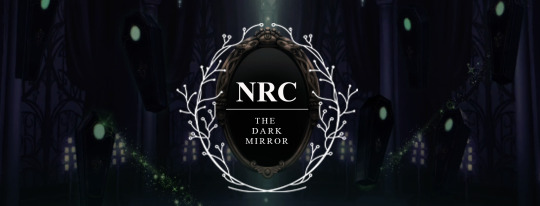
This was originally meant to be put out in October for Halloween but what is time management anyway?
SORTIGER
Inc: The Dark Mirror, Crowley, The Fairest Queen, some Draconia's sneaking in there (can't escape them)
WC: 1.9k
Warnings: Some depiction of violence
Summary: He was as he had always been, and he knew no other way—for the concept of anything other was quite beyond his comprehension.
(or: eldritch horrors your dark mirror <3)
He recalls the time before.
In the vast expanse of black in which he dwelled, corporeal but conscious of such, only the dim glow of suns thousands of years away guided him forth. The hum of the void was his calling, and his presence was a mere brush of stardust in the night. He was as he had always been, and he knew no other way—for the concept of anything other was quite beyond his comprehension.
It was within this vast expanse of black that he first witnessed the event that is the unexpected, and frankly quite messy, act of creation. The world of Twisted Wonderland was not crafted by hands in a slow, harmonious fashion; it was shoved into being with a flash, a bang, and a disruption of the peace until suddenly it was there in its spherical form. It startled everyone who was capable of being startled, as it was something that happened in a realm where nothing ever really changed at all.
He did not approach it first. That was one of the other hidden ones. They slithered forth in their serpentine form to taste this new offering, to feel what would become known as soil and inhale what would become known as air. In the beginning, Twisted Wonderland was a time of opportunity—a time of new growth that those who had existed so long now had forgotten. After the serpent, another crept down, and then another, until only he was left alone in the darkness. His form turned, and writhed, and debated what would be best to appear as until he finally descended in the shape of a figure like the denizens of the land, with a porcelain mask upon his face.
In the time that it took for him to settle, the others who had come prior had already left their marks upon the land. ‘Age of the Gods’ did the occupants so accurately coin it in their fables and tales. He bore witness to the ones he had never seen before now parade themselves as superiors, claiming that the gift of magic they had bestowed upon a few now let them hold a debt over their bodies. Considering this, he avoided direct involvement with either party, choosing to be more of a vagabond than anything else. The only time he interacted with anyone was when he told them truths.
Sortiger, he was called. Deliverer of prophecies to the masses—so long as one knew the right words to use.
He didn’t consider himself a prophet, but rather just a being that knows truths. He wandered area to area, devouring experiences he was deprived of for so long, and which this land was now giving to him in abundance. It was a liberating experience that he would not trade for any luxury that the others so hounded for.
Sortiger, as odd as it was, also served to be the chains that bound him in the end. Magic was a gift granted to a few to provide them the tools for easier living. Unfortunately, man is as cunning as he is ambitious. If one were to hear tales of a travelling prophet, what else would there be to do then try and bind them to you somehow? There is power in knowledge, and infinite knowledge means infinite control.
___________________________________________
It was a tailor’s apprentice who tricked him, in the end. A young woman with her needle and her thread who clothed him in a false sense of security. He was unaware that she was one of few blessed with the gift of magic. Or perhaps he was aware, and he simply chose to ignore that intuition in place of emotions, instead. It mattered little in the end—she had lured him into her trap like a spider in wait, and then paralyzed him when the moment was exactly right.
There’s magic in mirrors.
There always has been, even before the idea of Twisted Wonderland was born. He recalls vaguely the shimmering reflections of dust in the stars; it was one of the few times he was able to see his form—a writhing, black mass, dripping ichor with a burning heart that pulsated with each bit of life that crept through his veins. The sight always unsettled him because there is no hiding who you are before an item that is meant to show you in full.
He had fought.
Naturally, he had fought. He was a being of unmeasurable power that was not meant to be confined to a singular realm. He had screamed unholy screams and tore at the glass with nails until they broke, and split, and bled that ichor that so dripped from his body when he was unbound, and he was free. He had spewed curses and words with a blackened tongue, his porcelain face warped in rage and, worst of all, heartbreak.
This ire and this power are why, in her cunning, the tailor’s apprentice did not confine him to one place. There is a concept that humans share known as a panopticon; a circular platform meant to serve in prisons so one guard can keep an eye on everyone at once.
He was not trapped in a singular realm. He was instead trapped in multiple at once. He was held stagnant with thousands of mirrors surrounding him, showing the thousands of lands that he could have walked had he listened to his instincts instead of falling into the honeyed trap of gentle words and gentler touches. There was no ceiling, there was no floor—it was as though he had been returned to that void from whence he came.
So it goes that even gods fall prey to the whims of love.
He considered it a mercy, then, that he did not remain in her possession for too long. After all, if one were to hear tales of a prophetic mirror, what else would there be to do then try and steal it somehow?
But it was not a mercy to bear witness to the destruction that followed henceforth. Villages consumed by flames, steel finding more familiarity in the bellies of innocents than a blacksmith's forge. The tailor's apprentice had been slaughtered to gain access to his mounted form; if he had been free, he would have saved her, he would have wrapped her in his power and carried her to the stars above. Instead, all he could do was look in the mottled face of her killer as bloated lips tried to coax a story out of him.
It went like that.
From soldier, to merchant, to captain, to priests. He found himself meeting the most privileged in one moment and the most deprived the next. At one point, the term mirror, mirror, became synonymous with his existence and the prophecies he was meant to give. It may have been initiated by the woman that held onto him the longest. He met her when she was still a young girl, the crown on her head not as grand as the one yet to come. The fairest of them all—until her heart became warped with a combination of both paranoia and hate. She was as stunning as a portrait right up to the moment she met her end.
___________________________________________
This all has little relevance.
If one see’s enough faces, they begin to lose the ability to discern them. He has been bound in this panopticon for so long that he no longer has a comprehension of time, or of the worlds he examines. At one point, his mask begins to change—from smooth porcelain to one with a lace patterning upon his brow.
There was a princess he had met once who had a similar pattern on her face, though hers was of scales and not lace. He had not received her name, nor had she asked him any questions. She had stared into his reflection, her crown wrapped around the proud horns on her head and her eyes reflecting a sense of exhaustion that ran deeper than surface level, before she had simply turned away.
No mirror, mirror. No demands. Only a glance, and then she was gone into the night.
He considers that encounter the reason he ended up at Night Raven College. He sees that woman once more in the form of a boy who approaches him, a pair of proud horns on his head and his eyes reflecting a sense of anxiety that runs deeper than surface level. He considers it fate to be here once more—even though fate is but a vague manipulator to a being of his stature.
He considers it fate, too, when he encounters the human.
“Are you certain there’s no way home?” Crowley murmurs when the students all depart to their dorms. He studies the equally masked face when asked this question. Eons of existing has allowed him to recognize one who deceives without much effort—not that it’s his place to call the man out. He must be asked the right question to do that.
“Again.” He responds, voice lower and colder than the one used for the students. A small mercy. Crowley’s golden eyes narrow with their own darkness, which so often hovers just inches from the surface.
“Mirror, mirror, born from the unknown—is there a way to send the student home?” Crowley then drawls out, his voice dripping with contempt at each word he utters—such a stark contrast from the usual upbeat man he presents himself as. He must keep a smile from touching those porcelain lips as he affixes a blank gaze.
“We are not the ones who have the ability to do such an act.” He replies, the answer as blunt as ever.
What many do not know is that a mirror is not only a means of accessing a different location. Although he has serviced hundreds before to travel from one place to another, many remain unaware of his ability to let them travel from one world to another. He can never leave himself—the tailor’s apprentice made sure of that—but that doesn’t mean he can’t guide others.
She knew that—the woman who looked like the boy with the proud horns on his head. Not the princess, but instead someone older—someone who knew him when he was still with the fairest queen.
Queens are cunning—he has come to learn this over time.
Crowley clicks his tongue in disagreement. It’s a sharp, jarring sound that echoes in the empty chamber as he turns away to march back to the door. This inconveniences him. He has a plan that he’s attempting to follow, and the presence of an unknown variable is throwing that all off.
Is it pitiful? The mirror considers it quietly as the chamber door slams shut. The bubbling of the green fountain at his base remains the only source of noise left. The unknown variable may construe Crowley’s plans, but he knows that it would benefit him in the end. The woman had known that too. It was why he had let her do what she had asked.
He pulls his face back from this mirror and turns his attention towards the thousands of others that surround him. All of these lives, all existing with the freedom of movement, of choice.
He will join them soon. The lace on his face feels more prominent then ever, and he knows, he will join them soon.
#twst#twisted wonderland#twst fanfiction#no seriously what do u even tag this LMAO#anyway can u imagine being like eons old trapped in a janky mirror man#doesnt even get paid... doesnt get cleaned#not the life :///
36 notes
·
View notes
Note
I love the cuteagens! Maybe cuteagens staring Eskel and Letho?
The fire crackled between them, the discarded skin of the trout they had consumed half an hour before curling in the flames, and Letho tasted the air. He wasn't sure what possessed him in the moment. Around others, he masked his impulses carefully, because they provided too much of an insight into his relative strengths and potential weaknesses. But with Eskel sitting opposite, illuminated in the flickering amber of the firelight, his body a little dirty, a little travelled, with pheromones and sweat lingering in the linen of his open-necked shirt, Letho found it difficult to control himself.
His tongue lacked tastebuds or scent receptors, but it did collect chemicals from the air for him to press against the roof of his mouth, and it was here that his brain could process the taste of the world around him. Earthy salt from the remains of the fish and the damp soil, the rich tang of mineral oils Eskel was using to coat his steel blade after their successful arachas hunt, and a unique, spicy perfume that was uniquely Eskel. He tasted different to Geralt; Geralt was horse hair, arenaria and bitter on the tongue; Eskel was treated leather, deep, musky, something to be savoured. It was that aroma that had drawn Letho's eye in the tavern where they'd met that morning, and now it made his serpentine eyes flicker closed for a fraction of a second, so he could--
"Everythin' a'right?" asked Eskel in his usual, laidback drawl.
Letho opened his eyes slowly. "Nothin' amiss."
"Just... you licked the air."
"Salt on my lips."
"N'aww," Eskel said, his scarred lips quirking up at the corner. Couldn't get much past this sharp-eyed blood hound. "You licked the air. Seen you do it a few times before, now I come to think of it. Thought I was just seeing things."
Hmm. Letho had not been as discreet as he'd first thought. He considered his options. A continued lie wouldn't earn much more than a dismissive snort from the wolf, further confirming Eskel's belief that Letho hid more than he shared, which meant he was untrustworthy, or he could share this one little tidbit. A tiny sliver of trust in a witcher that had walked the Path as long as he had. Eskel had his own code based on honour, neutrality and avoidance of conflict. The threat was relatively minor and, Letho reasoned, if Eskel knew, then he could taste Eskel more often. Even if only on the air around him.
"I smell things that way."
"Huh." Eskel appeared to consider the information. It would go one of two ways. He would either judge it not sufficiently interesting and continue tending to the sword across his lap or, more likely, he would want to investigate. That was one thing Eskel and Geralt had in common, by Letho's evaluation. Curiosity. But whereas Geralt's extended to politics and people, Eskel's was purely based in the natural world. Couldn't show him an odd looking mushroom without him snaffling it off for a little analysis. If pressed, Letho would admit it to be somewhat endearing. "How's that work then?"
Those deep amber eyes, so much richer in colour than Letho's own, widened a little, trained on Letho's mouth. Letho let his tongue poke out again, topping up the taste of Eskel against the roof of his mouth. "There's a vomeronasal organ in the roof of my mouth. Works through chemoreception, which is--"
"I know what chemoreception is," Eskel huffed, putting his sword aside to roll onto his knees. "Same way basilisks and slyzards smell. Never considered you'd've been given mutagens from those sources. Makes sense though, biggest vipers outside the ones in the grass, although I always figured you'd have had more wyvern, an'--" Eskel was shuffling over but hesitated when Letho raised an eyebrow. Eskel's propriety caught up with him, and he sat back on his heels with a quiet rumble, a chastened hound whose nose had wandered too close to the dinner plate, "can I look?"
Eskel looking meant he got closer, and now that Letho had conceded a little, he wanted to concede more, just to see where it led. It was a slippery slope, and he could hear Ivar's lecture about the duplicitous nature of other schools droning in the back of his head. They were a distraction from the mission, blind to the real purpose of the order. Letho packaged him away in the recesses of his memory and focused on the broadness of Eskel's face.
Hillfolk, Letho recalled. The witch had said as much during one of her many pontifications. As much of a pain in his arse as she had been, Yennefer had provided lots of intelligence on the nature of the wolf school. Letho traced Eskel's wide brow and nose with his eyes; his fingers itched to follow their path, but he kept them resolutely on his thighs as his mouth dropped open for Eskel's inspection.
"Minor warping of the palate, but not much," Eskel murmured, leaning in closer. Letho couldn't hide his body's reaction. His skin crackled like it had been touched by lightning, and the smell of Eskel's made his head light. His palm left his thigh and cupped beneath Eskel's chin to pull him away, but only far enough to meet his eyes. The deepest gold Letho had ever seen, richer than Toussaintese honey. Eskel grimaced, "Got somethin' to say?" Eskel's fingers tightened around Letho's wrist in mild warning.
It was then that Letho realised what he'd done. Lifted a wolf's head to expose his throat. But Eskel hadn't bitten back, hadn't shoved him away; his pupils were blown wide, two black suns highlighted in liquid amber. Letho tilted his own head, tongue darting briefly between his lips. Arousal. And not just his own. Eskel had intended this to happen. "You're playing a dangerous game," Letho said.
"Only play games when the odds are in my favour," Eskel replied, keeping his gaze steady. Letho tested, slipping his hand a little lower to the hinge of Eskel's jaw. He saw the flicker of appreciation even if Eskel tried to keep his gaze level. Eskel pushed against Letho's palm. "Your move."
Letho considered his options, measured the disadvantages of revealing this little crack in his facade, and pulled Eskel towards him. Letho made the wolf arch, stretching him off balance to keep the game in his favour, and brought their lips together. Eskel tasted just as Letho expected; like the divine come to earth. The scent of him washed through Letho's body like a tide, consuming his every sense, leaving quivering eagerness in its wake.
When the wolf let out a little whine, a trill of pleasure followed by a slump on his posture, Letho crowded him to the ground. He slipped a hand into that awful fucking haircut to force Eskel's head back, and licked a long stripe up his exposed throat. Eskel arched against him, strong hands gripping hard at Letho's shoulders. "If I'd known you were so eager to show me your belly, dog," Letho growled. "I'd'a offered sooner."
"Shut up and fuck me," Eskel snarled, or tried, his voice broke around the moan Letho forced from him with a sucking bite at the hinge of his jaw.
Letho smirked, teeth somehow sharper in the dying firelight. "Gladly."
163 notes
·
View notes
Text
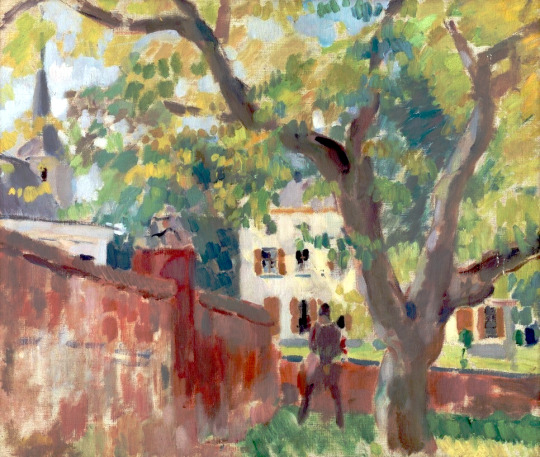
𝐑𝐢𝐤 𝐖𝐨𝐮𝐭𝐞𝐫𝐬 (𝐁𝐞𝐥𝐠𝐢𝐮𝐦 𝟏𝟖𝟖𝟐-𝟏𝟗𝟏𝟔)
𝐓𝐡𝐞 𝐎𝐥𝐝 𝐖𝐚𝐥𝐧𝐮𝐭 𝐓𝐫𝐞𝐞 𝐢𝐧 𝐌𝐚𝐥𝐢𝐧𝐞𝐬 (𝟏𝟗𝟏𝟐)
"31 October 1913
Dear Simon,
As I told you last time, I haven’t been very busy since your departure and I loathe everything around the house. I would like to work hard but, my God, nothing appeals to me, and I always feel like working from memory or developing some old sketches further. And then I begin to hesitate and time passes and every next day I try to convince myself that surely one doesn’t always have to paint things that one sees before one. At the moment I feel quite calm. Thanks to the fine weather, I’ve even found some very nice subject matter: strongly undulating autumnal undergrowth, large tumbling clods of earth forming a deep ravine, spanned by a small bridge, a kind of Roman arch, in soiled red brick, and more clods upon clods. Serpentine borders of green-black mosses, unaligned trees at the bottom of the gully. And above moves the sun, as nothing stays still and the whole scene screams out in yellow, green, delicate grey, black and pink. Rotten, well-rotten and smelling humid and moldy. All this seen from above. In a word, the first thing that has excited me since you left. I’m doing my best, but if the weather changes, all will be ruined!
Yours, Rik Wouters"
* * *
45 notes
·
View notes
Photo
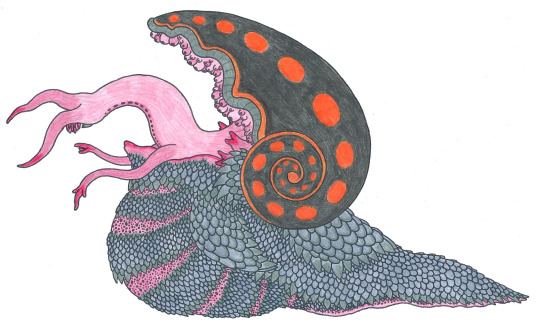
The volcanic deserts certainly give rise to some bizarre species, which isn't that big of surprise when you consider the ecosystem itself. A sandy landscape constantly besieged by violent storms with the only respite from these barren wastes being active flows of lava. These burning rivers give fuel to life, but not the kind you would expect. Plants are practically nonexistent here, as the storm filled, ash choked sky makes sunlight an unpredictable presence and the ground offers little in soil. Instead, strange fungus sprouts from the banks of these lava streams, feeding off the heat and substances produced by the molten fluid. I have already covered a number of these fungal species before, but you should know that they are quite bizarre and not nearly as edible as puff loaves and rind berries. Since they leech metals from the ground or suck up heat, their composition is alien to most digestive systems found around the world. Even dryads like myself cannot consume these fungi, despite our strong stomachs and resistance to many toxins. However, life here relies on these fungi as a constant source of food, so there are a myriad of species that can actually digest these bizarre things. It should be no surprise that the end result of this adaptation has created more odd beasts to roam these storm swept deserts. One that we will talk about today is the Fume Maw, a local who has quite the taste for these roasting fungi. In its usual state, many may be a bit confused on what a Fume Maw is. A scaly corpulent beast with a hard shelled head and armored flippers, a look that makes some try to tie it into reptiles. Perhaps it is some strange crocodile with a flip top head, or a fattened serpent, but the Fume Maw is no reptile. Instead, it's a snail, a fact easier to see when it opens its "mouth." The armored dome of this beast is no skull, but actually the snail's shell. It is hinged by muscle which allows it to flip itself open like a toothless maw and extend a serpentine "tongue." That pink appendage is the true head of the Fume Maw, hiding in its armored body until it needs to feed. Its exposed flesh is vulnerable to the harsh storms and predators, so its time out in the open is short. When it comes across tasty fungus, it pulls open its shell, darts out its head to grab hold and drag the whole thing back in with it. As you can imagine, this furthers the illusion that the shell is its true head, as this action looks like a tongue lashing out to swallow fungus whole. By pulling its food into its armored hiding place, it may feed at its leisure and not worry about being exposed to predators. Its thick scales and impenetrable shell is enough to ward off most attacks, but that isn't its only defense against foes. Due to the Fume Maw's diet of volcanic fungi, its body builds up reserves of some noxious materials. Normally, one would just excrete this waste and leave it for the scavengers, but this snail has found another use. It can break down these substances and turn it into a gaseous state. If a predator proves to be a bigger problem then its armor can handle, the Fume Maw will open up its fake mouth and belch out a great cloud of this vapor. What is in this gas isn't fully known, but we do know it is poisonous and extremely nasty. Reports say that it causes burning and irritation in sensitive membranes, like eyes and mouth, and breathing it in sears your lungs. The damage isn't lethal, but it sounds like it can really mess you up. People exposed to the gas have been temporarily blinded and are nearly asphyxiated by the chemicals filling their lungs. Even when rushed out of the cloud and given fresh air, they choke and cough for hours after. Even then, it is said weeks go by before they can breathe normally again, after the damage has been healed. It is an unpleasant experience, so keep that in mind before getting too close to one. A good way to tell if a Fume Maw is loaded with this wretched gas is to look at its "gut." If its body is swollen, then you know it has a store of this vapor on hand, ready to burp it out on any fool who dares threaten it.
Since this weapon is tied to its diet, people assume that raising a Fume Maw without these lava fungi will make a more docile breed. With no foul materials to make its gas, then it cannot bring harm to others, and it may even be edible! That line of thinking isn't exactly wrong, but it sadly just doesn't work. Fume Maws like mushrooms, but not just any kind. Their entire anatomy is designed to digest these volcanic growths, which means it cannot properly handle most other fungi from around the world. Attempts to raise a Fume Maw outside of its ecosystem without the specific foods has only resulted in malnourished, sickly individuals who eventually die from food poisoning or disease. Either the foreign foods they eat don't digest correctly and just rot in their stomach, or they actually contain toxins the Fume Maw isn't immune to and kills it outright. So this theory does not work because there currently isn't anything else you can feed these things outside of their usual fare. Just leave them be in their natural environment and appreciate them there! Though, good luck finding any enjoyment in a volcanic desert.
While they remain confined to their desert homes, they aren't entirely forgotten by the outside world. The Venoness that live near these ecosystems have found uses from its materials and inspiration from its design. Blight Vessels carved from Fume Maw shells have been seen, and their scales have been used to craft armor. I believe their guts and gas sacs are good material for brewing as well! These poison weavers have even copied the Fume Maw's defenses, of drinking special concoctions from their vessels and then belching out deadly clouds. Yes, I know that is actually a pretty common Venoness tactic, but I feel you can't help but draw the comparison! Maybe this is where that art started, or maybe it inspired new ways to....uh....burp. Yeah, I know nothing about magic, maybe I shouldn't be talking about this stuff....
Chlora Myron
Dryad Natural Historian
-----------------------------------------------------
“Fume Maw”
Okay, I think I have composed myself enough now to write about the burping snail.
62 notes
·
View notes
Text
Nemesis and Jill Go to Horny Jail (18+)
My periodically updated porn dump fic with my favs (well one of them...) doing the do. As I do.
________________________________________________
Nemesis and Jill Go to Horny Jail (18+)
Rated E; short 500 ficlet collection I add to whenever
Fandom: Resident Evil
Main Ship: Nemesis/Jill Valentine; Other Ships: TBD
Chapters: 5/?
CW: Varies by chapter. Has both con/non con/ect. Is listed as 'Creator Chose Not To Use Archive Warnings' so check listed cws on each chapter
(full tag list on AO3)
________________________________________________
Excerpt:
The bedsheets muffled Jill’s lips as she gasps and murmurs along them, long soiled by the absent drool that ungracefully trailed from her. She was in no position to sit up and fix this, as a large fist that easily contained her throat and could more if wanted to held her downwards forcing her head down ass up.
The perfect mating position.
Her arms were bound behind her back, the living things moving with a torturous serpentine slowness reminding that they could at any time coil tighter, so much tighter. Her legs were sprawled open as Jill was forced into a downward kneel, him forcing her thighs wide apart enough to not deny the Tyrant what he wanted.
Not the large fist, nor the tentacles were the cause of her ruined state. It was the large thumb, the flat of that finger’s nail that was her focus, the reason she was squirming and incoherently mewling. It slid and prodded with taught precision, using her slick to glide across her hardened nub, sometimes tapping against it causing aftershocks as she near wept with both arousal and frustration.
(Continue reading Nemesis and Jill Go to Horny Jail on A03)
#nemesis x jill#monster x human#nemestine#monsterfucker#terato#villianfucker#ao3 fanfic#thetentaclecommander writes stuff#monster smut#monster kink#teratophillia#monster lover#tentacles#size difference#monster fucking#monster boyfriend#content warning#read the tags#as the sex fluctuates from con to non con#resident evil nemesis
17 notes
·
View notes
Text
@firstarisen screamed :
"Damn. Haven't seen that ass strutting around infernal soil in uh--"
He glances at the wrist watch that he isn't wearing.
"--a hot minute. And here I thought you'd croaked. Guess I gotta jot down another bitch on my extensive list of problems. Welcome back, Lily."

Lilith just wanted to get some greasy fast-food and go hunting for vinyl sleeves. that's ALL that Lilith wanted to do tonight ; and yet, here she is, in front of her favorite vinyl-related store, and she catches Adam's visage in the reflection of the wide display window when he addresses her.

❝ hah ! the hell is mister high-and-mighty doing on infernal soil, anyway ? ❞ Lilith bites back after a minute, her serpentine-like fangs on full display as she deflects his statement.
She may be smiling and she may look relaxed, but internally she's the opposite, no matter how much her core begs Lilith to reunite with her other half.
The demoness knows that he's in some form of disguise, or he would've been eaten alive by now. her own disguise is up, which is supposed to only be visible to those related by blood.. but evidentially, her literal half can see right through it, and she can see right through his.
#◜lilith: in character.◞#◜lilith / v. alt.◞ 🇮'🇲 🇹🇷🇴🇺🇧🇱🇪 ﹠ 🇾🇴🇺'🇷🇪 🇼🇦🇳🇹🇮🇳🇬 🇮🇹 ﹗#◜lilith: inbox / replies.◞#firstarisen#firstarisen adam
5 notes
·
View notes
Text
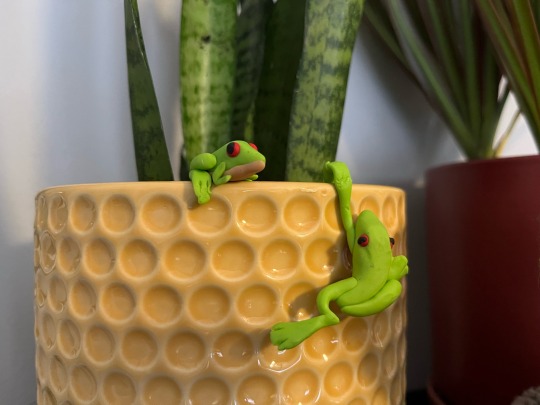
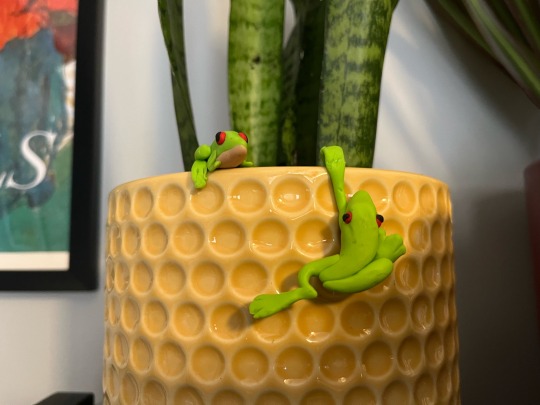
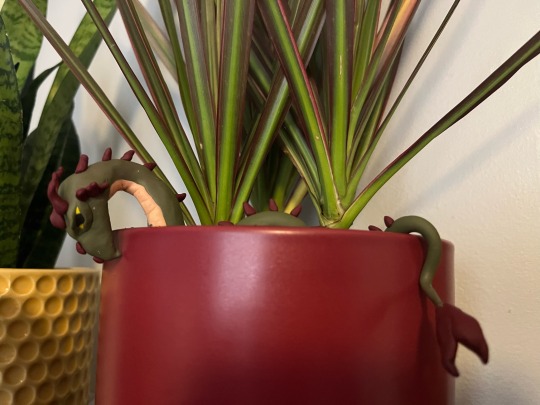
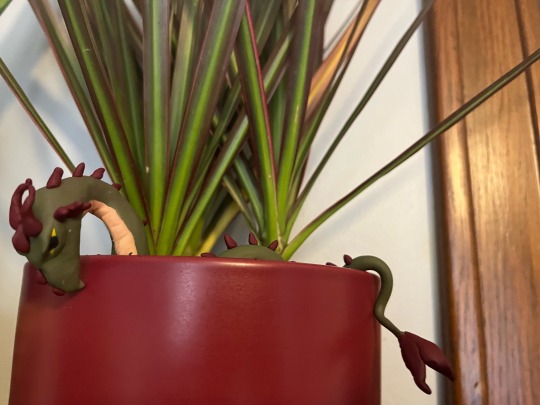
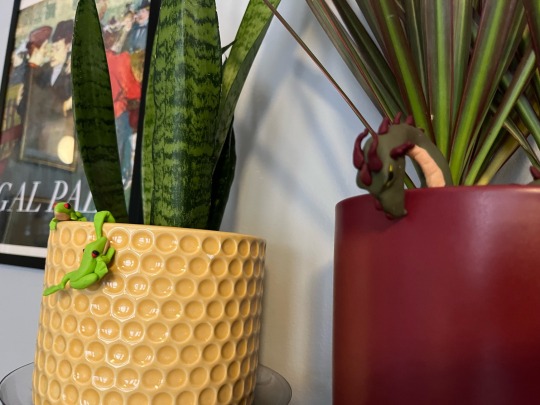
Can't stop making these tbh. New frog friends from today, plus some bonus shots of the dragon from earlier
[ID: Several photos showing polyclay animal figurines decorating houseplant pots. The first two photos are of two frogs on a bright yellow pot. Both are light green with white bellies and red eyes, and one sits on the ledge of the pot while the other climbs up the side. The third and fourth photo show a miniature polymer clay sculpture of a dragon in three parts, sitting inside a red plant pot. The dragon's body is green, long, and serpentine, seeming to wind through the soil of the pot with only parts of its body above the surface. It's head and tail partially hang off the side of the pot. It has red horns on its head and red spines all along its length. Finally, the last photo is of the two pots next to each other on the same shelf. End ID.]
36 notes
·
View notes
Text
Nawovuherszi, the Lady of Serpentine Horses and Ripped Wings
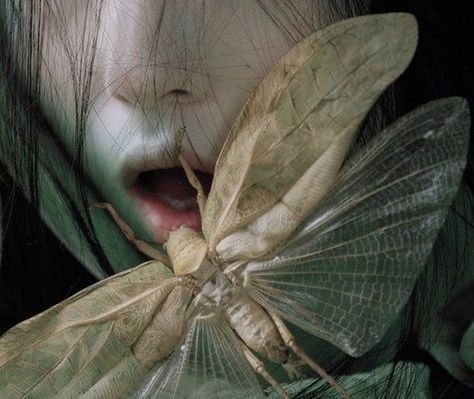



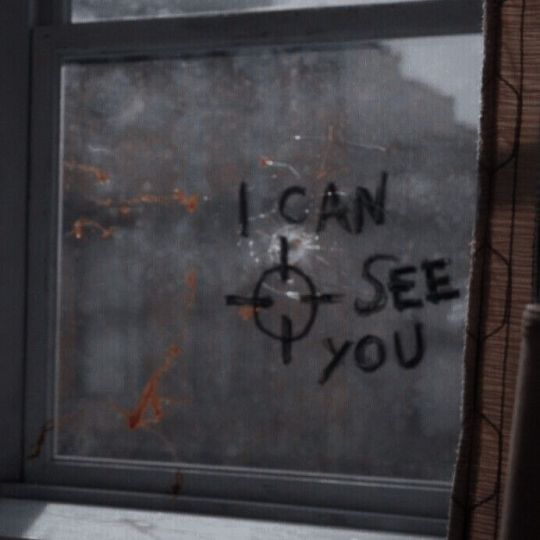

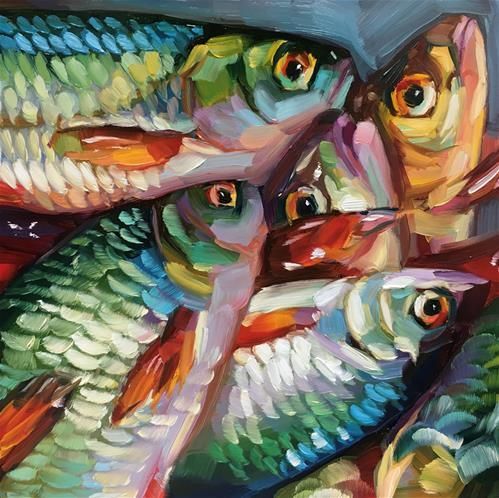
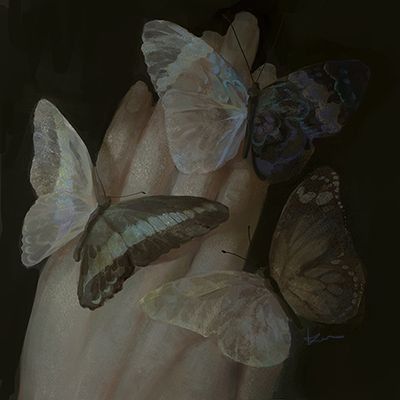

The given up child of a full-blooded ichthyocentaur father and half-Gorgon half-fairy mother who was raised by a human couple. Despite having her wings ripped, she kept her head held high and achieved great success as a masterful assassin. She doesn't let her optimistic, mischievous spirit be soiled by childhood and adulthood grievances.
#writerscorner#writing#creative writing#original character#hybrid#changeling#gorgon#fairy#ichthyocentaur#assassin#moodboard
4 notes
·
View notes
Text
Mining? Sustainable?
So, it was Earth Day yesterday (hope everyone celebrated) and I was thinking to myself about a fun little topic that would be relevant to talk about, because I love me some fun little topics, but I decided to be a little serious. Who is she? I don't know.
Because this isn't cute and fun I am not posting it on my cute and fun blog and I will talk about it on this account instead. I wanted to talk about two topics, the first is squeezing everything from the rocks that must be mined and the second is carbon sequestration.

Mining is not a popular topic, in fact most people hate the idea of it, however, it is an unavoidable truth in our attempts to move to a greener future. Why? Because technology requires resources. Of course we should recycle our old technology as much as possible to decrease the amount of mining necessary, but its unavoidable. However, there are so many ways people are trying to make this process better! And I want to talk about those ideas.
The first is that a lot of heavy metals are able to move in water/erosion processes, this is a problem we have faced in terms of contamination for many years, and why retaining ponds exist (to prevent bad water from leaving the site). But still a lot of companies will scrap the soil off the surface of the ground to get access to the rock holding the desired resource. However, the soil above the rocks tend to have the same or sometimes higher yield in some of the desired elements than the rock they mine.
This is an exciting find because if we must disturb a site, it is best to get everything we can from it.
Another related topic is revisiting sites that have been mined in the past. We haven't always wanted Rare Earth Elements, but now they are really important for solar panels, wind turbines, and electric cars.

So we can go back to these already disturbed sites and get these important metals without effecting other locations. Great, amazing, beautiful.
Another new hot thing is Carbon Sequestration. So lets talk about it. First I would like to say, this is something that occurs without human interference! The plain English explanation is CO2 in the air/water will react with ultramafic rocks on the surface and in will essentially absorb the CO2 into a new mineral.
The specific reaction is commonly having a rock bearing olivine and serpentine which in the presence of CO2 will form a carbonate like magnesite, calcite, and dolomite. It is a very simple idea, and something we see in nature already, but it is a great way to utilize previous mining sites to get the most value out of them!
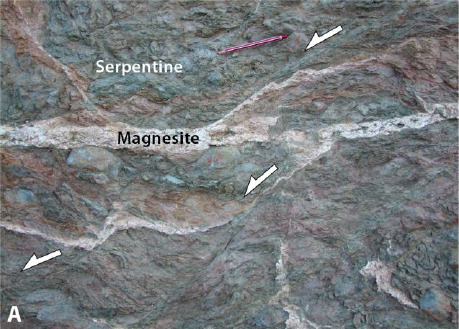
Long story short, it is really exciting to look to see what work is being done to be ecofriendly in the mining industry, as geologists are generally very eco-conscious themselves.
Anyway, I know this isn't all the work being done, but this was the topic of much research being done at the SE GSA conference and it left me feeling very excited. I know it isn't my usual topics but thanks for reading!
2 notes
·
View notes
Note
‘ you know me by heart . it infuriates me that you know me by heart . ’
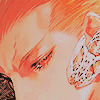
“What foolishness you spout. Would the King not be knowing of that which belongs to him?”
In his serpentine irides surveillance glowers, undulating amid the interstitial lattice of her frustrations, rising an august gaze of sumptuous bloadsoak, piercing eyes reflecting the bloodfed cutlasses which pitilessly wounded the Luzon's heart, rendering it bleeding; with as much cutting survey does the King inspect her touted ‘infuriation’, a designation which so scantly crossed the compendium of her verbiage, appraising it with all the fine operation of one who has long witnessed lesions apparent in the moral integument of man. By heart, she claims; how amusing a restraint, as if any such bond could enforce itself on a mind unbounded. Indeed, if it was by heart that the King knew her, it was by the rush of her own, its tenderness pooling like clinquant moonlight flowing into the cusp of his chalice, such vintage it distilled itself to his taste. This organ of sentiment which bore her home may sunder apart, think itself obscured, partake in the fiercest measures of obduration, venture to the varied plains amidst broken shores and umbral stars, but always shall she find in it the cord to her longing, and him holding the tether at its ultimate end.
“I have long known the hearts of mankind. That is how I know when they are worth nurturing — or worth crushing. But you venture upon insult, mongrel. As if that would be the instrument through which I know you. How convenient of you to speak not of your shamelessness, nor your brazen tongue which ventures upon commendation one second and becoming meal for my lions the next,” He clicks his tongue. “Then you would tell not of my eyes which have borne every folly of your struggle, nor these hands that have been your finest blade. My, even infants make better show of gratitude.”
His words run from the span of flame to a apocalyptic conflagration with dark motes, ancestral edification running low, viper-like, the fire which was humanity’s first boon and lesson, fire that razes the forest and nourishes the soil, fire which cauterizes both wounds and insolence, fire which commands mans’ respect, fire which inspires creation, the fire of stars, the fires of every hell. “How you tempt me, girl. It seems you are in need of a reminder of your blessings.” A god-razing finger raises, palmar flexion lines like the Earth’s primeval, stolid contours, like inscriptions of the myths he has inspired, syndesmology as the golden capillaries of human civilization viewed from the cosmos, a finger dipped in the abyssal inkwells of human literature, more monumental than Creazione di Adamo, pressing sharply on Hakuno’s chest. Gilgameš's eyes glower, their unrelenting crimson brilliant and heavily thrumming, as if, in all of their divinity, was the blood of the Anthropocene, and within himself the atavistic churning of vitality that flowed through all mankind. And in so being human and embodying humanity, he speaks to the humanity within her.
“Yours is a heart which beats in spite of itself. Hah, and you would give little ear to its thrum. Bear it. Such is the burden of man. Be not the fool who only realizes they have one until he should see it outside of himself.” The King withdraws his rare-given touch, sanctified lids lowering upon rich, andesine brilliance. “Tch. Many are your farces. But that is one which suits you ill.”
#kishisms#𝐚𝐧𝐬𝐰𝐞𝐫𝐞𝐝. the king has spoken.#𝐈𝐂. šarrum sa in šarri šūturu anāku.#(icon art credit: nunok / ID 80119848)#// *me millennia later* Thank you for this ask Koi!
6 notes
·
View notes